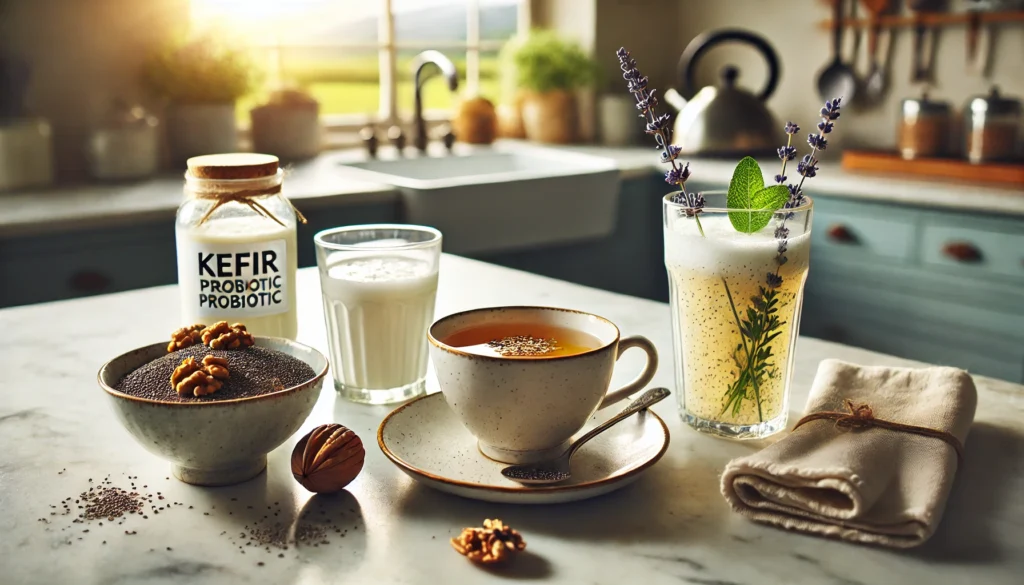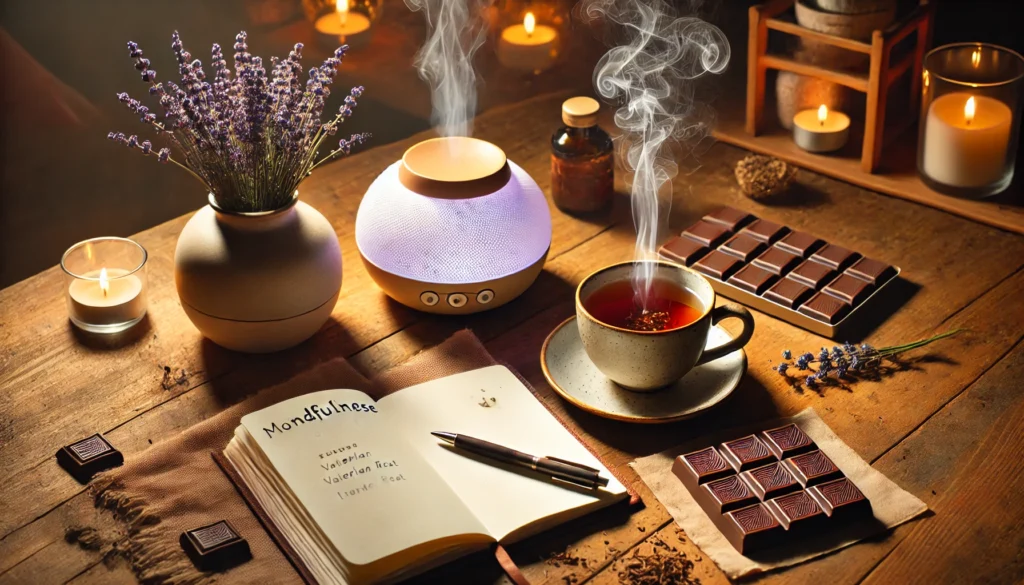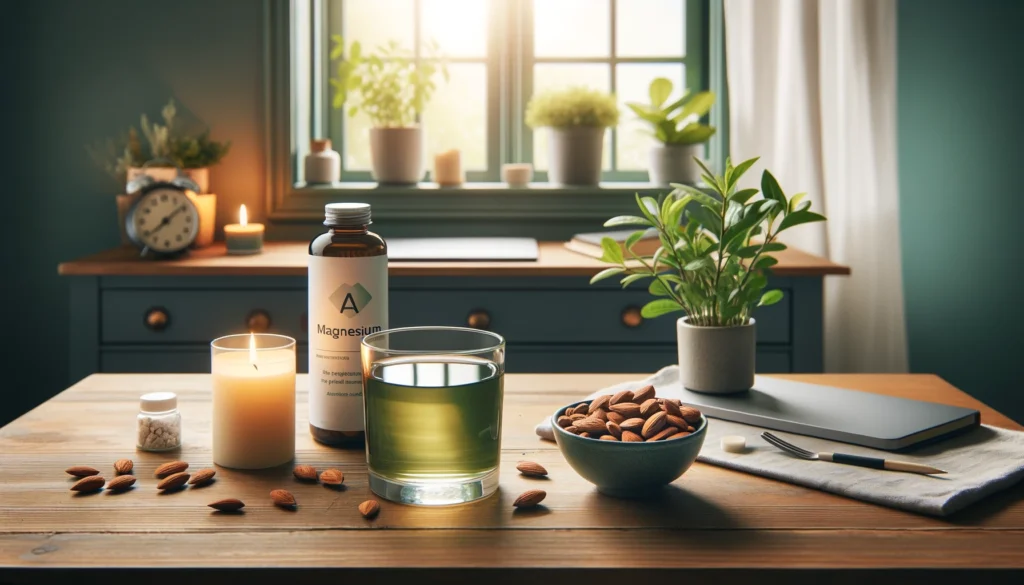Stress and anxiety are common experiences in today’s fast-paced world. They can impact our health, productivity, and overall quality of life.
But what if the solution to managing these feelings could be as simple as what we drink?
This article explores the world of stress relief drinks. It delves into what to drink for stress and anxiety, providing a comprehensive guide on the best beverages for calming the mind and body.
We’ll look at the science behind these drinks, examining how their ingredients can influence our body’s stress response. We’ll also delve into the historical use of certain beverages and herbs for relaxation and stress relief.
From traditional teas to innovative relaxation beverages, we’ll cover a wide range of options. We’ll also discuss the role of diet and hydration in managing stress and anxiety.
Whether you’re a health and wellness coach, a science journalist, or a biohacker, this article aims to provide you with reliable, accessible, and practical information.
So, let’s embark on this journey to discover how the right drink could be a key ingredient in your stress management strategy.
You may also like: Top Supplements to Alleviate Anxiety Naturally

Understanding Stress and Anxiety
Stress and anxiety are more than just feelings. They are complex physiological responses to perceived challenges or threats. Understanding them begins with recognizing the symptoms.
These responses can be triggered by various factors. Work pressures, financial worries, or even social situations can set them off. They often manifest as rapid heartbeat, restlessness, or a sense of impending doom.
Chronic stress and anxiety can negatively impact overall health. They contribute to issues such as heart disease, obesity, and sleep disturbances. Mental health is equally affected, often leading to depression or burnout.
To manage stress and anxiety, a comprehensive approach is essential. This involves lifestyle changes, mental health practices, and dietary considerations.
A major component of dietary considerations is identifying supportive nutrients and beverages. Certain drinks can help mitigate stress and provide mental calmness.
Incorporating stress-relief beverages is one piece of a larger puzzle. Let’s explore the scientific mechanisms and historical context of these therapeutic drinks.
The Science of Stress
Stress triggers a cascade of hormonal changes in the body. The primary hormone involved is cortisol, which is produced by the adrenal glands. Elevated cortisol levels can lead to various health issues.
Additionally, the neurotransmitter norepinephrine plays a role in the stress response. It prepares the body for action, often resulting in a “fight or flight” reaction.
The nervous system, particularly the sympathetic nervous system, is activated during stress. Prolonged activation can be detrimental, affecting both physical and mental health.
How Beverages Can Help
Certain beverages can modulate the body’s stress response. Ingredients like adaptogens and amino acids support the body’s resilience to stress.
For instance, L-theanine, a compound found in tea, promotes relaxation. It helps reduce stress without causing drowsiness, enhancing focus and calmness.
Many drinks incorporate herbal ingredients, historically used to soothe and relax. Recognizing which beverages work best for individual needs is crucial.
The right beverage not only aids in stress management but also complements other wellness practices. Choosing the right calming drink can be transformative in one’s journey to health.
The Role of Diet in Stress Management
Diet plays a critical role in stress management. The right nutrients can help regulate mood and energy levels. A well-balanced diet is essential for optimal health.
Certain foods and drinks can have direct effects on stress levels. Consuming nutrient-rich items supports the body’s ability to handle stressors. This reduces the impact on both physical and mental health.
Conversely, a poor diet can exacerbate stress and anxiety. High sugar and processed foods may increase mood swings and fatigue. This highlights the importance of choosing foods wisely.
Here are some dietary components that aid in stress management:
- Omega-3 fatty acids: Found in fatty fish, they support brain health.
- Magnesium: Present in nuts and leafy greens, it calms the nervous system.
- Probiotics: Beneficial for gut health, which influences mental well-being.
- B vitamins: Help maintain a healthy nervous system.
Incorporating these elements into daily meals can be beneficial. Nutrients like omega-3s and magnesium are particularly powerful. They offer a potent defense against stress.
Nutrients That Combat Stress
Certain nutrients stand out for their stress-combating properties. Magnesium is a prime example, known for its calming effect. It supports the nervous system and helps reduce anxiety.
B vitamins are another group of important nutrients. They play crucial roles in neurotransmitter function and energy production. Consuming foods rich in B vitamins can enhance mental resilience.
Additionally, omega-3 fatty acids are vital. They are known to reduce inflammation and support brain health. Including fish, chia seeds, or walnuts in the diet can bolster these effects.
A diet focusing on these nutrients may help alleviate stress. Such nutritional support can be a valuable complement to other stress management practices. Individual needs may vary, so personalizing dietary choices is key.
Hydration and Stress
Adequate hydration is often overlooked in stress management. Staying hydrated helps maintain optimal physical and mental functions. It is crucial for regulating mood and cognitive performance.
Cortisol levels, the body’s primary stress hormone, can be affected by hydration status. Dehydration can lead to increased stress levels and decreased cognitive ability. Drinking water regularly supports a calm, focused state.
To manage stress, aim for sufficient water intake daily. Choose beverages like herbal teas or water over sugary drinks. This simple action can enhance overall well-being and stress resilience.

Top Calming Drinks for Anxiety Relief
When anxiety strikes, turning to a calming drink can offer solace. The right beverages can soothe nerves and promote relaxation. They are accessible allies in stress management.
Calming drinks can range from herbal teas to nutrient-rich smoothies. Each comes with unique benefits tailored to various needs. Understanding their effects can help optimize their use.
Several drinks have been traditionally revered for their calming properties. These beverages are valued for their natural ability to ease tension. They can be simple yet effective additions to your routine.
A few drinks that help with anxiety:
- Chamomile tea: Known for its calming effects.
- Green tea: Rich in L-Theanine and antioxidants.
- Lavender infusion: Offers soothing aromatic benefits.
- Magnesium-rich smoothies: Support nervous system health.
These drinks provide more than just immediate relief. Incorporating them consistently can have long-term benefits. They can form part of a comprehensive stress management plan.
It’s vital to experiment and identify what suits your needs. Personal preferences play a role in the effectiveness of these drinks. Enjoying what you drink can amplify its calming impact.
Understanding how these beverages work aids in selecting the right ones. Their calming effects are rooted in both tradition and science. Each sip brings a step closer to tranquility.
Chamomile Tea: A Traditional Soother
Chamomile tea is renowned for its soothing qualities. For centuries, it has been a go-to remedy for anxiety and insomnia. Its gentle floral aroma itself is calming.
The calming effect of chamomile is backed by science. Its compounds, such as apigenin, bind to brain receptors and promote relaxation. Drinking chamomile tea before bed can improve sleep quality.
Incorporating chamomile into your routine is simple. Enjoy a warm cup in the evening to unwind. Its effect is subtle but powerful, making it a household staple.
Green Tea: Antioxidants and L-Theanine
Green tea combines the best of both worlds: energy and calm. It is rich in antioxidants that combat oxidative stress. This can improve overall well-being and brain health.
The secret ingredient is L-Theanine, an amino acid promoting relaxation. It works synergistically with a small amount of caffeine in green tea. This provides a calm alertness, perfect for enhancing focus.
Drinking green tea can be a ritualistic approach to stress management. Enjoy it mid-morning for a balanced boost. It helps reduce anxiety while offering mental clarity.
Herbal Infusions: Lavender, Lemon Balm, and More
Herbal infusions like lavender and lemon balm offer aromatic relaxation. Lavender is known for its calming scent, often used in aromatherapy. When brewed as a tea, it can soothe tension.
Lemon balm, a citrus-scented herb, acts as a gentle sedative. It can improve mood and cognitive function, easing anxiety symptoms. Infusions of these herbs can be a daily calming ritual.
Experimenting with herbal blends can yield unique flavors and effects. Combining various herbs caters to individual taste and needs. This diversity adds a fun element to stress management.
Magnesium-Rich Drinks: Natural Nervous System Regulators
Magnesium is essential for a calm nervous system. It helps regulate neurotransmitters and supports muscle relaxation. Drinks rich in magnesium can alleviate anxiety effectively.
Smoothies with ingredients like spinach, almonds, and bananas boost magnesium intake. These smoothies are not only nutritious but also comforting. Consuming them regularly helps maintain a state of calm.
Magnesium supplements can also be added to beverages. This enhances their calming effects, especially for those with deficiencies. Always consult a healthcare professional before adding supplements.
Innovative Relaxation Beverages
The world of relaxation beverages is evolving with novel innovations. These modern stress relief drinks combine traditional knowledge with scientific advancements. They offer versatile options for managing stress and anxiety.
Newer beverages focus on unique ingredients and functionalities. They are designed to deliver specific benefits like reducing stress or boosting mood. With increasing awareness, these drinks are gaining popularity.
Innovative drinks are made with adaptogens, probiotics, and specialized herbs. They leverage natural compounds to promote relaxation. When incorporated into daily life, they can subtly influence mental and physical well-being.
Some notable trends in innovative relaxation beverages include:
- Adaptogenic drinks: Utilizes stress-fighting herbs.
- Probiotic drinks: Focuses on gut-brain connection.
- CBD-infused beverages: Taps into calming properties.
- Nootropic beverages: Enhances cognitive function.
Personal preferences shape the choice of these drinks. Experimentation is crucial in discovering effective options. Balancing taste and benefits is a rewarding journey.
Embracing these novel beverages means embracing holistic health. They complement a lifestyle focused on well-being. Relishing these drinks can become a part of stress management rituals.
Adaptogenic Drinks: Harnessing Ancient Wisdom
Adaptogenic drinks utilize herbs known for balancing stress. These herbs, used in traditional medicine, now gain recognition in modern beverages. They help the body adapt to stress, supporting resilience.
Ashwagandha, Rhodiola, and holy basil are popular adaptogens. Each offers distinct properties like reducing anxiety or boosting energy. Their inclusion in beverages delivers these benefits in a soothing form.
These drinks can be part of a daily wellness routine. Sipping them mindfully aids in embracing calmness and focus. They offer a convenient way to integrate ancient wisdom into contemporary life.
Probiotic Drinks: Gut Health and Mental Well-being
Probiotic drinks align gut health with mental well-being. The gut-brain connection highlights how gut health influences mood and stress levels. These drinks promote a balanced microbiome.
Kombucha and kefir are examples of probiotic beverages. They are rich in beneficial bacteria and can enhance digestion. A healthy gut supports the production of mood-regulating neurotransmitters.
Regular consumption can lead to lasting benefits. Maintaining gut health can reduce anxiety symptoms. Probiotic drinks are thus a palatable step towards improved mental health.
Choosing the right probiotic drink involves understanding personal needs. Different strains offer varied benefits for gut and brain health. Exploring diverse options helps find what works best for you.
The Impact of Caffeine and Sugar on Anxiety
Caffeine and sugar are prevalent in many of our daily beverages. While they add flavor and energy, they can also affect anxiety levels. Understanding their impact is crucial for managing stress through what we drink.
Caffeine can provide a quick energy boost and improve focus. However, excess intake may exacerbate anxiety symptoms. Some people are more sensitive to caffeine’s effects, leading to jitteriness and heightened stress.
Sugar, on the other hand, can create an initial sense of comfort. But it can also lead to energy crashes and mood swings. The body’s blood sugar levels can heavily influence overall mental state.
Choosing drinks with lower caffeine and sugar content can help. Opting for natural sweeteners and decaffeinated options supports a balanced approach. This mindful selection may reduce anxiety-inducing impacts.
Caffeine: A Double-Edged Sword
Caffeine is often praised for its stimulating properties. It can enhance alertness and mood temporarily. Yet, it also increases the release of adrenaline, known as the stress hormone.
When consumed in moderation, caffeine can be beneficial. However, overconsumption may overwhelm the nervous system. This can exacerbate feelings of anxiety and disrupt normal relaxation cycles.
Individuals vary in their tolerance to caffeine. Observing its effects personally is key. Limiting intake, especially in the afternoon and evening, can mitigate its anxious impact.
Sugar: The Sweet Stress Intensifier
Sugar has a way of sneaking into stress relief beverages. It creates a temporary sense of well-being by releasing dopamine. But this is often short-lived and followed by an energy crash.
The fluctuating energy levels caused by sugar can mimic stress symptoms. This can make it difficult for the body to maintain equilibrium. Sugar also spikes insulin levels, which can affect mood stability.
Consuming drinks with high sugar content can intensify stress over time. Switching to natural sugars or unsweetened options can lessen this impact. This small change can lead to more consistent energy and better mood regulation.

Lifestyle Factors and Stress Relief Drinks
Lifestyle choices significantly influence the effectiveness of stress relief beverages. Incorporating holistic practices can maximize their benefits. This integration fosters a harmonious mind-body relationship.
Stress management isn’t limited to what we drink. Exercise, sleep, and nutrition also play pivotal roles. A well-rounded lifestyle complements the calming effects of beverages.
Incorporating routines that promote mental wellness enhances beverage benefits. Consistent practices ensure that stress relief becomes a sustainable routine. This can lead to long-term mental health improvements.
Consider these complementary lifestyle factors:
- Exercise: Elevates mood and reduces stress.
- Sleep Quality: Critical for recovery and anxiety reduction.
- Nutrition: Provides essential nutrients that aid stress management.
By aligning these aspects with beverage choices, individuals can effectively mitigate stress and anxiety. It’s about finding harmony between physical actions and nutritional support.
Exercise and Stress Relief Beverages
Exercise is a natural stress reliever. It boosts endorphins, lifts mood, and improves resilience. Combined with the right drinks, it can double the impact on stress relief.
Post-workout beverages can optimize recovery and relaxation. Drinks rich in electrolytes and nutrients replenish the body. They also balance the nervous system, aiding in tension release.
Pairing stress relief drinks with regular exercise supports overall well-being. This synergy creates a more robust defense against stress. Making time for both exercise and the right beverages fosters a proactive approach.
Sleep, Routine, and Beverage Choices
Quality sleep is a cornerstone of stress management. It allows the body to reset and heal. Consuming the right beverages can promote better sleep and deeper relaxation.
Chamomile or valerian tea are popular for their soothing properties. Consuming such drinks before bed can improve sleep quality. This helps regulate mood and reduce anxiety symptoms over time.
Developing a routine is vital for effective stress relief. Regularly consuming calming beverages can become a comforting ritual. This adds structure to daily life, aiding both mental and physical recovery.
Conclusion: Integrating Stress Relief Drinks into Your Life
Integrating stress relief drinks into daily routines can be a gentle yet powerful tool in managing stress and anxiety. These beverages serve as both a practical and enjoyable method to support mental well-being. Selecting beverages tailored to individual needs can optimize their calming effects.
A holistic approach enhances the benefits of these drinks. Pair them with consistent lifestyle habits like adequate sleep, a balanced diet, and regular exercise. This balanced approach can create a comprehensive foundation for stress management. By experimenting with different drinks and observing their effects, you can find the perfect blend that aligns with your personal wellness goals.
Further Reading:
Health: Which Foods and Drinks Help Reduce Anxiety?
Medium: 5 refreshing drink recipes for stress relief and detoxification
Healthline: 7 Everyday Tonics that Help Your Body Adjust to Stress and Anxiety
Important Note: The information contained in this article is for general informational purposes only, and should not be construed as health or medical advice, nor is it intended to diagnose, prevent, treat, or cure any disease or health condition. Before embarking on any diet, fitness regimen, or program of nutritional supplementation, it is advisable to consult your healthcare professional in order to determine its safety and probable efficacy in terms of your individual state of health.
Regarding Nutritional Supplements Or Other Non-Prescription Health Products: If any nutritional supplements or other non-prescription health products are mentioned in the foregoing article, any claims or statements made about them have not been evaluated by the U.S. Food and Drug Administration, and such nutritional supplements or other health products are not intended to diagnose, treat, cure, or prevent any disease.


